法律英语 TORT
- 格式:ppt
- 大小:2.39 MB
- 文档页数:35
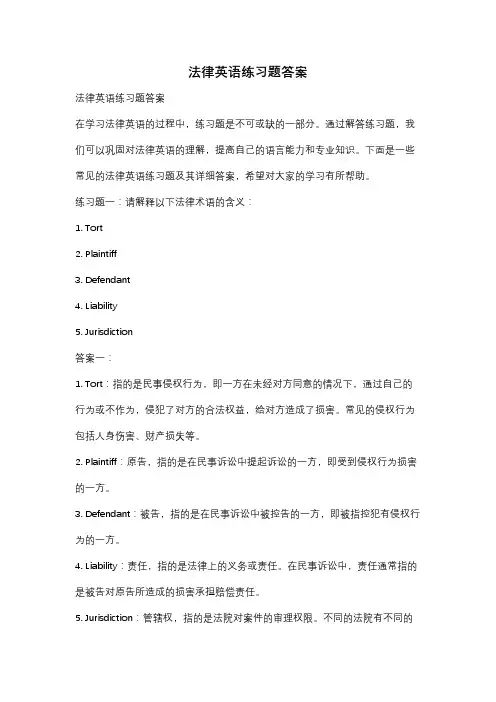
法律英语练习题答案法律英语练习题答案在学习法律英语的过程中,练习题是不可或缺的一部分。
通过解答练习题,我们可以巩固对法律英语的理解,提高自己的语言能力和专业知识。
下面是一些常见的法律英语练习题及其详细答案,希望对大家的学习有所帮助。
练习题一:请解释以下法律术语的含义:1. Tort2. Plaintiff3. Defendant4. Liability5. Jurisdiction答案一:1. Tort:指的是民事侵权行为,即一方在未经对方同意的情况下,通过自己的行为或不作为,侵犯了对方的合法权益,给对方造成了损害。
常见的侵权行为包括人身伤害、财产损失等。
2. Plaintiff:原告,指的是在民事诉讼中提起诉讼的一方,即受到侵权行为损害的一方。
3. Defendant:被告,指的是在民事诉讼中被控告的一方,即被指控犯有侵权行为的一方。
4. Liability:责任,指的是法律上的义务或责任。
在民事诉讼中,责任通常指的是被告对原告所造成的损害承担赔偿责任。
5. Jurisdiction:管辖权,指的是法院对案件的审理权限。
不同的法院有不同的管辖权,根据案件的性质、金额等因素来决定哪个法院有权审理该案件。
练习题二:请将以下英文法律名词翻译成中文:1. Contract2. Arbitration3. Injunction4. Intellectual property5. Negligence答案二:1. 合同2. 仲裁3. 禁令4. 知识产权5. 过失练习题三:请解释以下法律原则的含义:1. Presumption of innocence2. Due process3. Burden of proof4. Reasonable doubt5. Double jeopardy答案三:1. Presumption of innocence:无罪推定,指的是在刑事诉讼中,被告在未被证明有罪之前,应被认定为无罪。
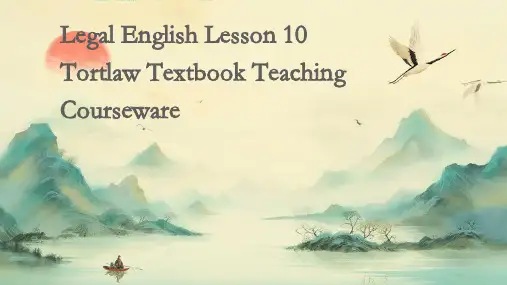
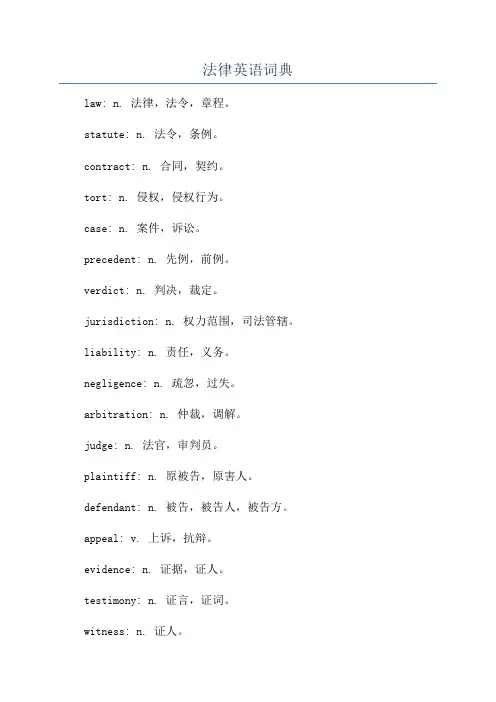
法律英语词典law: n. 法律,法令,章程。
statute: n. 法令,条例。
contract: n. 合同,契约。
tort: n. 侵权,侵权行为。
case: n. 案件,诉讼。
precedent: n. 先例,前例。
verdict: n. 判决,裁定。
jurisdiction: n. 权力范围,司法管辖。
liability: n. 责任,义务。
negligence: n. 疏忽,过失。
arbitration: n. 仲裁,调解。
judge: n. 法官,审判员。
plaintiff: n. 原被告,原害人。
defendant: n. 被告,被告人,被告方。
appeal: v. 上诉,抗辩。
evidence: n. 证据,证人。
testimony: n. 证言,证词。
witness: n. 证人。
adjudicate: v. 审判,判决。
jury: n. 陪审团。
court: n. 法院,庭。
lawsuit: n. 一案,官司。
prosecution: n. 控告,公诉。
docket: n. 案卷,审判案卷。
declaration: n. 声明,宣言。
lawyer: n. 律师,法律顾问。
counsel: n. 辩护律师。
bond: n. 缔约,保证。
sentence: n. 判决,宣判。
writ: n. 法院令。
litigation: n. 诉讼,诉讼行为。
appellate: v. 上诉,抗辩。
damage: n. 损害,损失。
asset: n. 财产,财务资产。
insurance: n. 保险。
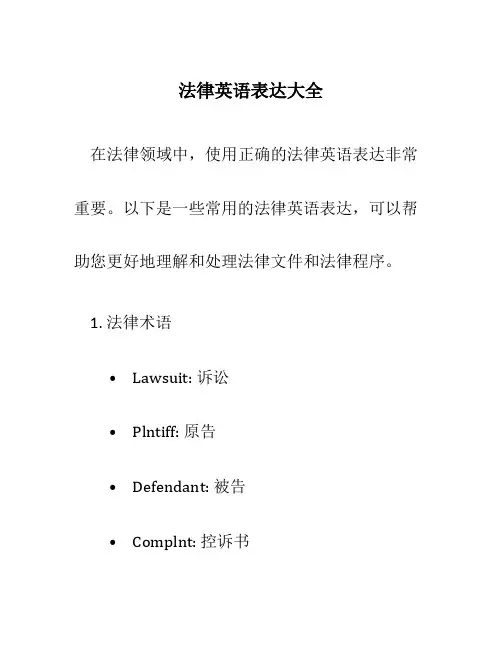
法律英语表达大全在法律领域中,使用正确的法律英语表达非常重要。
以下是一些常用的法律英语表达,可以帮助您更好地理解和处理法律文件和法律程序。
1. 法律术语•Lawsuit: 诉讼•Plntiff: 原告•Defendant: 被告•Complnt: 控诉书•Summons: 传票•Pleadings: 诉状•Subpoena: 传唤令•Evidence: 证据•Burden of proof: 举证责任•Statute: 法令•Tort: 民事侵权行为•Testimony: 证言•Criminal offense: 刑事犯罪•Misdemeanor: 轻罪•Felony: 重罪2. 法庭程序•Court hearing: 庭审•Trial: 审判•Opening statement: 开庭陈述•Cross-examination: 盘问•Closing argument: 闭庭陈述•Verdict: 裁决•Jury: 陪审团•Bench trial: 座席审判(没有陪审团的审判)•Judgment: 判决•Appeal: 上诉•Court reporter: 法庭记录员•Arrest: 逮捕•Bond: 保释金•Bl: 保释•Evidence: 证据3. 合同和协议•Contract: 合同•Agreement: 协议•Offer: 出价•Acceptance: 接受•Consideration: 对价•Breach of contract: 违反合同•Void contract: 无效合同•Negotiation: 谈判•Arbitration: 仲裁•Mediation: 调解•Termination: 终止•Amendment: 修改•Effective date: 生效日期4. 法律文件和法律文件结构•Legal document: 法律文件•Affidavit: 宣誓书•Power of attorney: 授权书•Will: 遗嘱•Trust: 信托•Deed: 契约•Contract: 合同•Agreement: 协议•Compliance: 遵守•Notice: 通知书•Affirmation: 证言•Declaration: 声明•Schedule: 时间表•Exhibit: 附表5. 法律职业•Attorney: 律师•Judge: 法官•Magistrate: 地方法官•Counsel: 律师•Paralegal: 法律助理•Legal secretary: 法律秘书•Legal consultant: 法律顾问•Court clerk: 法庭书记员•Barrister: 出庭律师(英国律师)•Solicitor: 执业律师(英国律师)以上是一些常用的法律英语表达。

法律英语的词汇特征与相对应的翻译要求
法律英语是一种特殊的语言,具有其独特的词汇特征。
在法律文件中,经常出现一些特定的词汇和短语,这些词汇往往具有严格的法律含义和规范用法。
对法律英语词汇的翻译要求也更为严格和准确。
下面将介绍一些法律英语的词汇特征,并分析相对应的翻译要求。
法律英语的词汇特征还包括频繁使用的法律术语和短语。
在法律文件中,经常出现大量的法律术语和短语,这些术语和短语通常具有特定的规范用法,对翻译人员的专业水平和语言功底提出了较高的要求。
“tort”(侵权行为)、“attorney at law”(执业律师)、“pro bono”(无偿服务)等术语和短语都具有较强的专业性和规范性,翻译时需要准确理解其含义和用法,确保翻译的准确性和规范性。
法律英语的词汇特征还表现为具有复杂的法律逻辑和推理性。
在法律文件中,经常存在大量的复杂、抽象的法律逻辑和推理,需要翻译人员具有较强的逻辑思维能力和分析能力,准确理解和表达法律文本中的逻辑关系和推理过程。
法律判决书中的理由部分、法律条款中的解释部分等都需要翻译人员具有较强的逻辑推理能力和准确的语言表达能力,确保翻译的严谨和准确。
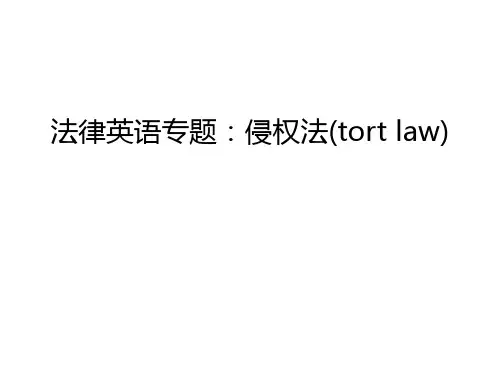
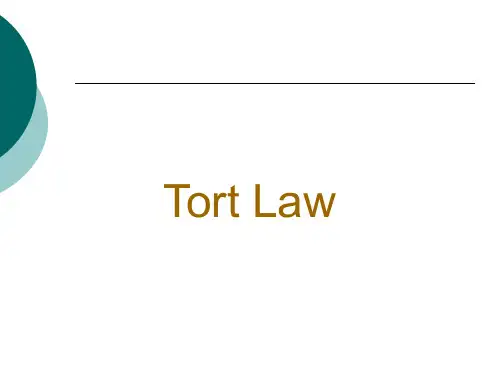
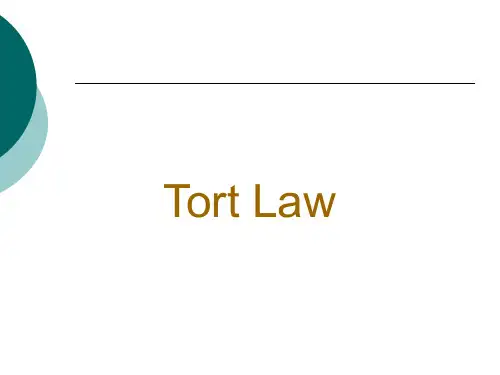
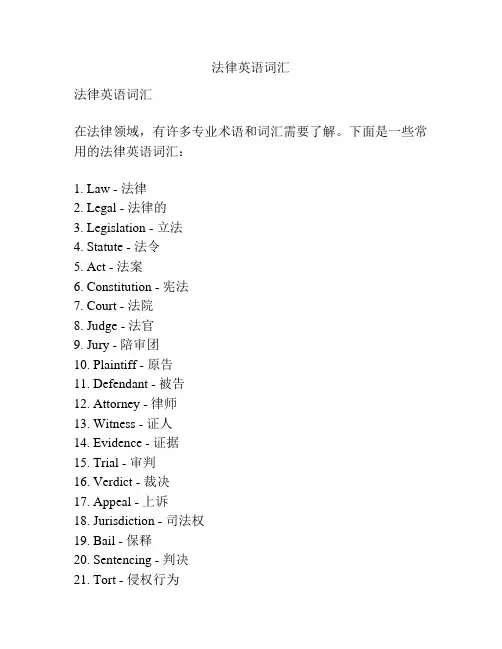
法律英语词汇法律英语词汇在法律领域,有许多专业术语和词汇需要了解。
下面是一些常用的法律英语词汇:1. Law - 法律2. Legal - 法律的3. Legislation - 立法4. Statute - 法令5. Act - 法案6. Constitution - 宪法7. Court - 法院8. Judge - 法官9. Jury - 陪审团10. Plaintiff - 原告11. Defendant - 被告12. Attorney - 律师13. Witness - 证人14. Evidence - 证据15. Trial - 审判16. Verdict - 裁决17. Appeal - 上诉18. Jurisdiction - 司法权19. Bail - 保释20. Sentencing - 判决21. Tort - 侵权行为22. Contract - 合同23. Breach - 违约24. Liability - 责任25. Damages - 赔偿金26. Negligence - 疏忽27. Fraud - 欺诈28. Property - 财产29. Estate - 房地产30. Will - 遗嘱31. Trust - 信托32. Patent - 专利33. Copyright - 版权34. Trademark - 商标35. Infringement - 侵权36. Bankruptcy - 破产37. Contractual - 合同的38. Criminal - 刑事的39. Civil - 民事的40. Administrative - 行政的41. Constitutional - 宪法的42. International - 国际的43. Liability - 责任44. Negligence - 疏忽45. Intentional - 故意的46. Due Process - 正当程序47. Jurisprudence - 法学48. Precedent - 先例49. Stare Decisis - 依据先例50. Habeas Corpus - 人身保护权51. Confidentiality - 保密性52. Dispute - 争端53. Injunction - 禁令54. Public - 公共的55. Private - 私人的56. Liability - 责任57. Malpractice - 不当行为58. Probate - 遗产审计59. Slander - 诽谤60. Libel - 诽谤罪61. Suing - 控告62. Settlement - 和解63. Restitution - 赔偿64. Breach of contract - 违约65. Act of God - 天灾66. Affidavit - 宣誓书67. Doctrines - 教条68. Breach of trust - 违背信任69. Jurisdiction - 司法权70. Lien - 留置权71. Remedy - 补救72. Statutes of limitations - 时效法73. Contempt - 蔑视74. Acquittal - 无罪释放75. Inadmissible - 不可采用的76. Null and void - 无效77. Alibi - 不在场证明78. Arraignment - 传讯79. Litigation - 诉讼80. Conviction - 有罪定罪81. Cross-examination - 盘问82. Defamation - 诽谤83. Inquest - 审讯84. Disbar - 剥夺执业权85. Extradition - 引渡86. Fiduciary - 受托人87. Indictment - 起诉书88. Plea - 奏折89. Pro bono - 免费律师90. Testimony - 证词91. Warrant - 法令92. Appeal - 上诉93. Bailiff - 安保人员94. Dismiss - 解雇95. Embezzlement - 盗窃罪96. Forfeit - 剥夺97. Injunction - 禁制令98. Mitigating - 降低99. Notary - 公证人100. Tortfeasor - 侵权者以上是一些常见的法律英语词汇,希望对您有所帮助!。
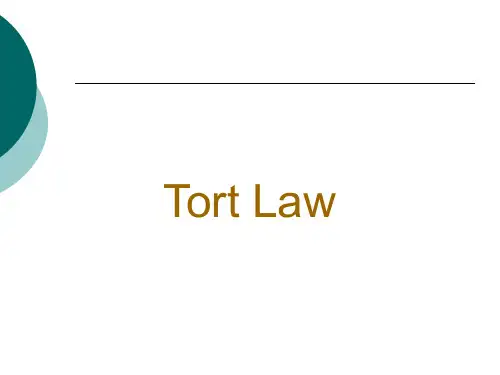
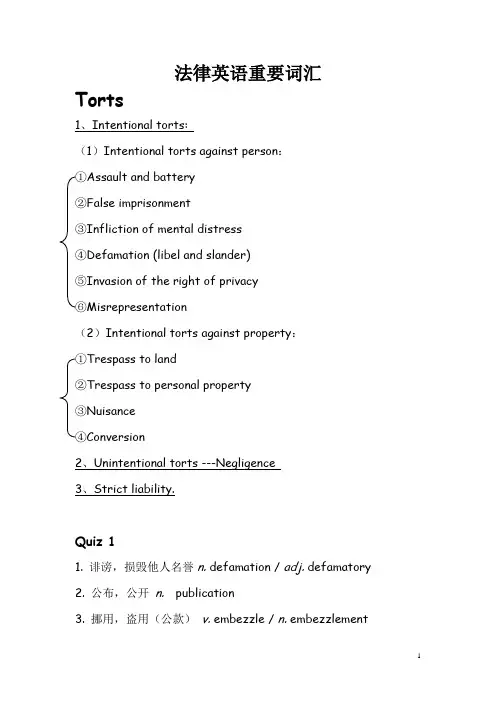
法律英语重要词汇Torts1、Intentional torts:(1)Intentional torts against person:Assault and battery②False imprisonment③Infliction of mental distress④Defamation (libel and slander)⑤Invasion of the right of privacyMisrepresentation(2)Intentional torts against property:Trespass to land②Trespass to personal property③NuisanceConversion2、Unintentional torts ---Negligence3、Strict liability.Quiz 11. 诽谤,损毁他人名誉n. defamation / adj. defamatory2. 公布,公开n. publication3. 挪用,盗用(公款)v. embezzle / n. embezzlement4. 恶意malice5. 不动产realty ; 动产personalty6. 虚假陈述misrepresentation7. 扣押,拘留v. detain / n. detention8. 留置lien9. 因果关系causation10. 诉讼费用costs11. 特权privilege12. 口头诽谤slander13.(对他人不动产的)滋扰或妨害nuisance14. 侵占(他人动产)conversion15. 不可预见的unforeseeable / unforeseeablility16可预见性foreseeability17. 跟单买卖documentary sale18. 适当的理由,充分的根据probable cause19. 重新审判的动议motion for new trial20. 公众人物public figure21. 未经他人允许将他人的姓名或肖像擅自用于商业用途The appropriation of a person’s name or picture for commercial purposes without permission22. 法定(为法律所认定或认可)的损害Legally recognizable damage (injuries)23. 事实上的原因actual cause (causation in fact)24. 对财产的绝对占有权(排它性的财产占有权)The right to excusive possession of the property25. 分摊过失,共同过失contributory negligence26. 最后无危险机会原则the last clear chance doctrine27. 提单和保单bill of lading & insurance policy28.陪审团审判the jury trial29. 不顾陪审团裁决而由法官直接判决的动议Motion for judgment notwithstanding the verdict30. 诋毁性的,诽谤性的表述defamatory statements31. 为要丑化某人将信息公布公开Publication of information that places a person in a false light32. 公共事务matters of public concern33. 近因proximate cause34. 替代性原因superseding cause35.风险自负assumption of risk36. 相对过失,比较过失comparative negligenceQuiz 21. 租赁,出租;租期v. / n.lease2. 显失公平,不正当n.unconscionability3. 确定,识别;辨认,鉴定v. identify / n. identification4. 收回,取回,重新获得v.repossess5. 存款,保证金;使沉积,存放n. / v.deposit6. 破产者,无力偿还者;破产的,无力偿还的n. / adj. insolvent7. 信托,委托n.entrustment8. 商销性,适销性n.merchantability9. 免责声明n. disclaimer10. (合同)相对性n. privity (of contract)11. last clear chance 最后清楚机会,最后明显机会12. comparative defenses 相对抗辩,比较抗辩13. the statute of frauds 反欺诈条款14. tender of delivery 指示交付15. fungible goods 可替代货物16. warehouse receipt 仓单,仓库收据17. sale-on- approval contract 试用买卖合同18. sale-or-return contract 准许退货合同19. insurable interests 保险权益,可保权益20. product liability 产品责任1、Battery is the intentional, harmfu l or offensive touching or contact of another without his consent.2、Assault is an attempt to cause a harmful or offensive contact with another if it causes a reasonable apprehension or fear of immediate threat to his or her physical safety.3、False imprisonment is the intentional confinement of a person for a period of time without his consent.4、Confinement may result from physical barrier to the plaintiff’s freedom of movement, or the use of physical force or the threat to use physical force against the plaintiff.5、Defamation refers to unprivileged publication of false and defamatory statements that injures a person’s reputation or character.6、Libel is written defamation and may also be in print, picture, or in any other permanent, visual form.Libel is actionable without any proof of special damage to the plaintiff (due to its more permanent nature and theseriousness).7、Slander is oral or spoken defamation.Slander is generally not actionable without proof of special damage (unless the nature of the statement is so serious that it can be classified as slander per se).8、Actual malice ---either knowledge of falsity or a reckless disregard of the truth9、Compensatory damagesPunitive damagesNominal damages10、Invasion of privacy is the tort of intentional intrusion into the private affairs of a person.11、Individual’s affairsMatters of public concern12、False light in the public eyes arises when one publishes false materials designed to make a person look bad.13、Public disclosure of private facts about an individual arises when information private in character is exposed to the public.14、Appropriation occurs when a person’s name, picture or other likeness is used for commercial advantage without his consent.15、Commercial exploitation16、Any time a person, without permission, enters onto, above, or below the surface of land that is owned by another or causes anything to enter onto the land, or remains on the land or permits anything to remain on it, such action constitutes the civil tort called a “Trespass to land”.Trespass is that there must be an actual (physical), tangible interferences.No actual harm to the land is required for liability of “Trespass to land”.17、Nuisance is the unreasonable and unlawful interference with another person’s right to the use or enjoyment of his land. Nuisance does not necessarily involve any physicalinterferences of a person’s property.For nuisance liability to exist, the interference must be substantial and unreasonable. Nuisance example: noise, smoke, vibrations, the projection of light, unpleasant smell…18、Whenever any individual unlawfully harms the personal property of another or otherwise interferes with the personal property owner’s right to exclusive possession and enjoyment of that property, trespass to personal property (personalty) occurs.19、Conversion is the intentional and unlawful exercise of control or dominion (power) over the personal property of another without his consent.Conversion is defined as any act depriving an owner of personal property without that owner’s permission and without just cause.20、Negligence ---the unintentional causing of harm that could have been prevented if the defendant had acted as a reasonable and prudent person.21、The reasonable person standard --a reasonable person of ordinary prudence in similar circumstances22、greater reluctance23、Causation----a close causal connection between Defendant’s conduct and Plaintiff’s injury.24、Actual cause (cause in fact)--- The defendant’s conduct is the actual cause of the plaintiff’s injury if that injury would not have occurred but for the defendant’s breach of duty.A but for test :(to determine the existence of actual cause)25、This idea of placing some legal limit on a negligent defendant’s liability for the consequences of her actions is called Proximate cause (legal cause), which is a question not of fact, but of law and social policy.Although a defendant’s conduct may have been the actual cause of a particular plaintiff’s injury, she/he is liable only if his/her conduct was also the proximate (legal) cause of that injury.26、Superseding/ Intervening forces(cause)--- a superseding or intervening force may break the connection between a wrongful act and injury to another.27、Actual / proximate / superseding causeNegligent actual cause InjuriesConduct But for test(A+B+C…)Negligent Proximate cause InjuriesConduct Foreseeablility (A+B)Negligent Intervening force InjuriesConduct Superseding cause(Unforeseeablility)28、Assumption of risk---a plaintiff who voluntarily enters intoa risky situation, knowing the risk involved, will not be allowed to recover.29provides that plaintiffs who fail to exercise reasonable care for their ownsafety are totally barred from any recovery if their contributory negligence is a substantial factor in producing their injury; where both parties have been negligence, and their combined negligence has contributed to cause the injury.30the doctrine enables both the plaintiff’s and defendant’s negligence to be computed, and the liability for damages distributed accordingly.31、Last clear chance is a doctrine that can excuse the effect of a plaintiff’s contributory negligence.32、Strict liability (liability without fault)---liability for injury is imposed for reasons other than fault.33、Firm offer---must be made by a merchant in a signed writing which contains assurances that the offer will be held open and not revoked.34、Additional terms35、Any agreement modifying a contract needs no consideration to be binding.Modifications must be made in good faith.When modification without consideration requires a writing. 36、Statute of fraud---If the contract price is $500 or more, there must be a writing in order for the contract to be enforceable.37、Parol Evidence Rule38、Unconscionability39、Identification---is a designation of goods as the subject matter of the sales contract, which can be made only by separating the contract goods from the mass.(a few exceptions)40、fungible foods41、risk of loss42、Tender of delivery---is the seller’s placing or holding of conforming goods at the buyer’s disposition(with any necessary notice), enabling the buyer to take delivery.43、A sale on approval is not a sale until the buyer accepts (approves) the offer. Title and risk remains with the seller.44、A sale or return is a sale that can be rescinded by the buyer without liability. Title and risk remains with the buyer.45、Insurable interest---the right to purchase insurance on goods to protect one’s property rights and interest in the goods.gains an insurable interest when the goods are identified to the contract.The seller has an insurable interest in goods as long as he or she retains title to the goods.46、the voidable title rule---a person who has a voidable title to goods can pass good title to a bona fide purchaser for value47、the entrustment rule---a person who buys goods in the ordinary course of a dealer’s business takes free of any claim of a person who entrusted those goods to the dealer.48、Warranty of title--- guarantees the seller’s right to transfer goods to a later buyer.49、Warranties of performance are designed to encourage honesty in transactions because they assure the buyer that the goods will conform to certain standards of performance.50、Good title---The seller warrants that she has good and valid title and the right to transfer the goods. If the seller’s title proves defective, the buyer has a right to recover damages from the seller.No liens---The seller also warrants that she will deliver the goods free from any security interests or liens which the buyer did not know about at the time they contracted.No infringements--- A merchant also warrants to the buyer that the goods do not violate or infringe on a third person’s patents, copyrights or trademarks.51、Express warranties are the guarantees which result from the parties’expectations, and they arise from the specific words of the parties and must become part of the basis of their bargain.52、Implied warranties are imposed by Article 2 of the UCC.A. the warranty of merchantabilityB. the warranty of fitness for a particular purpose53、The foreign-natural test is applied whenever consumersdiscover some substance within food or drink that they feel should not be there.54、The reasonable-expectation test is the court’s way of asking what a reasonable person would expect to find in food or drink—even if the substance is not foreign.55、Implied warranty of merchantability--- An implied warranty of merchantability automatically arises in every sale of goods made by a merchant who deals in goods of the kind sold.56、Implied warranty of fitness for a particular purpose--- arises when any seller (merchant or non-merchant) knows the particular purpose for which a buyer will use the goods and knows that the buyer is relying on the seller’s skill and judgment to select suitable goods.57、How to make “Express warranty disclaimers”:A. in language that is specific, clear and unambiguousB. in language that is called to a buyer’s attention58、How to make “Implied warranty disclaimers”:(1)the implied warranty of merchantabilityA. use the word merchantabilityB. make the disclaimer conspicuous if it is in writing(2)the implied warranty of fitness for particular purposeA. use a writingB. make the disclaimer conspicuousThe difference between merchantability warranty disclaimer and fitness warranty disclaimerA. Unlike the fitness warranty disclaimer, a disclaimer of theB. Disclaimers of the merchantability must always use theword . No special words are needed to disclaim the fitness warranty.59、Privity of contract60、Product liability---based on negligence。
法律英语常用词汇大全民事法律民事法律是指规范个人之间关系以及个人与社会之间关系的法律规范体系。
在法律英语中,有许多常用词汇与表达方式用于描述与解释民事法律的各个方面。
本文将为您介绍一些常用的法律英语词汇,以帮助您更好地理解民事法律。
一、合同和责任1. Contract (合同): A legally binding agreement between two or more parties, which establishes the rights and obligations of each party.- Offer (要约): A proposal made by one party to another, indicating their willingness to enter into a contract.- Acceptance (接受): The act of agreeing to the terms and conditions of an offer, creating a legally binding contract.- Consideration (对价): Something of value exchanged between the parties, typically money or goods, as part of the contract.2. Breach of contract (违约): The failure, without legal excuse, to perform any promise that forms the whole or part of a contract.- Damages (损害赔偿): Monetary compensation awarded to the injured party in a breach of contract case, intended to restore them to the position they would have been in if the contract had been performed.- Specific performance (强制履行): A court order requiring the breaching party to fulfill their obligations as specified in the contract.- Rescission (撤销): The cancellation of a contract, returning the parties to their positions prior to the contract.3. Tort (侵权行为): A civil wrong that causes harm or loss to someone, giving the injured party the right to sue for damages.- Negligence (疏忽): Failure to exercise reasonable care, resulting in harm to another person.- Duty of care (注意义务): The legal obligation to act in a way that avoids causing harm to others.- Proximate cause (直接原因): The primary cause of an injury, which is legally sufficient to result in liability.二、争议解决和证据1. Arbitration (仲裁): A process in which disputes are resolved by one or more impartial individuals, known as arbitrators, rather than by a court.- Mediation (调解): A process in which a neutral third party assists the disputing parties in reaching a voluntary and mutually acceptable agreement.- Litigation (诉讼): The process of going to court to resolve a legal dispute.- Plaintiff (原告): The party who initiates a lawsuit and seeks a legal remedy.- Defendant (被告): The party against whom a lawsuit is filed and who is required to respond to the allegations made by the plaintiff.2. Evidence (证据): Any type of information or material that is presented in court to prove or disprove a fact in issue.- Testimony (证词): Oral or written statements made by a witness under oath.- Exhibit (展品): A document or physical object presented as evidence in court.- Expert witness (专家证人): A person with specialized knowledge or experience in a particular field, called upon to provide an opinion or analysis in court.三、赔偿和保险1. Compensation (赔偿): Payment or remuneration for injury, loss, or harm suffered by someone.- Personal injury (人身伤害): Physical or psychological harm caused to an individual, often resulting in a claim for compensation.- Wrongful death (非正当死亡): A death caused by the negligent or intentional actions of another person, leading to a legal claim by the deceased person's family or estate.- Liability insurance (责任保险): Insurance coverage that protects individuals or businesses from the risk of being sued and held legally liable for injuries or damages caused to others.2. Settlement (和解): An agreement reached between the parties involved in a legal dispute, typically resulting in the withdrawal of a lawsuit in exchange for specific terms and conditions.- Release (解除): A legal document signed by a party, absolving the other party from any further liability or obligation, often in exchange for a settlement payment.- Indemnity (赔偿款): A contractual obligation to compensate an individual or entity for losses or damages they may suffer.四、合法程序和法院1. Due process (正当程序): The principle that individuals have the right to fair treatment and a fair trial before being deprived of life, liberty, or property.- Habeas corpus (人身保护令): A legal action that requires a person under arrest to be brought before a judge or into court, especially to secure their release unless lawful grounds are shown for their detention.- Jurisdiction (管辖权): The power and authority of a court to hear and decide a case.- Appellate court (上诉法院): A court that reviews decisions made by lower courts, typically focusing on issues of law rather than fact.2. Plaintiff's attorney (原告律师): The lawyer who represents the plaintiff in a civil lawsuit.- Defense attorney (辩护律师): The lawyer who represents the defendant in a civil lawsuit.- Judge (法官): The official who presides over a court of law and decides legal issues and the outcome of a case.- Jury (陪审团): A group of citizens selected to hear and evaluate the evidence presented in a trial and render a verdict.总结:本文介绍了一些常用的法律英语词汇,涵盖了民事法律中的合同和责任、争议解决和证据、赔偿和保险,以及合法程序和法院等方面。
Tort 侵权-法律英语术语Tort 侵权-法律英语术语由站整理。
1.In tort law the duty is imposed by the law.在侵权法中,责任是由法律规定的。
2.Some jurisdictions have established this tort to provide a remedy for malicious deeds.有些司法管辖区规定了此种侵权行为,目的是对恶意行为受害人提供救济。
3.Such tort-feasors are jointly and severally liable.此种侵权行为为要承担共同和连带责任。
4.The law of tort provides rules of conduct that regulate how members of society interact and remedies if the rules are breached and damage is suffered.侵权行为法提供行为规那么,标准社会成员的互相交往以及在该规那么被违背和损害发生是,如何进展救济。
5.The law of tort aims to compensate those who have suffered as a result of a tort.侵权行为法的目的在于补偿被损害人。
6.Tort law is a branch of civil law that is connected with civil wrongs,but not contract actions.侵权法属于民法的一部分,其与民事过错相关,与合同行为无关。
7.Tort liability for negligence presupposes causality between the negligent act and the injury to person or property.过失侵权责任以过失行为与对人身或财产的侵权之间的因果关系为前提。
大一上法律英语知识点在大一上学期学习法律英语期间,我掌握了许多重要的法律英语知识点。
以下是我在这个学期里学到的关于法律英语的重要知识点的总结。
一、法律体系与法律职业:法律体系是指一个国家的法律规范的组织结构。
主要包括宪法法律、法律法规、行政法规、地方性法规等。
同时,我们也学习了法律职业的不同分支,如律师、法官、法务经理等。
法律职业需要具备的素质有专业知识、分析问题的能力、沟通能力等。
二、法律英语基础:1. 法律英语词汇:学习法律英语首先需要熟悉一些基础词汇,比如contract(合同)、tort(侵权行为)、plaintiff(原告)、defendant(被告)等。
2. 法律英语语法:了解一些特定的语法规则在法律英语中很重要。
比如,在表达法律条款时需要使用被动语态,句子结构要清晰简洁。
三、合同法:合同法是法律英语中一个重要的领域,它规范了合同的成立、履行和解除等方面。
在学习合同法时,我们需要了解以下内容:1. 合同的要素:合同的要素包括合同的主体、合同的内容、合同的形式等。
当合同中缺少任何一个要素时,合同可能无效。
2. 合同的履行:了解合同的履行过程、履行的方式,以及违约责任等。
3. 不当竞争禁止:学习了解竞业禁止协议的法律规定,以及企业之间在竞争方面的权利与义务等。
四、知识产权法:知识产权法保护创意和创新,以鼓励人们在各个领域中进行研究和创作。
以下是知识产权法的一些要点:1. 版权法:了解版权的定义、著作权的保护期限,以及侵权行为的法律后果等。
2. 商标法:学习商标的注册过程、商标的保护范围,以及商标权的侵权行为等。
3. 专利法:了解专利的种类、专利权的取得方式,以及专利的侵权认定等。
五、争议解决:1. 诉讼程序:了解民事诉讼的一般程序,如起诉、答辩、举证等。
2. 仲裁程序:了解仲裁的特点、仲裁协议的要素,以及仲裁结果的强制执行等。
六、国际商法:国际商法规范了跨国商业活动中的法律关系。
在学习国际商法时,需要了解以下方面:1. 国际货物销售合同:了解国际货物销售合同的成立、履行和争议解决等方面。